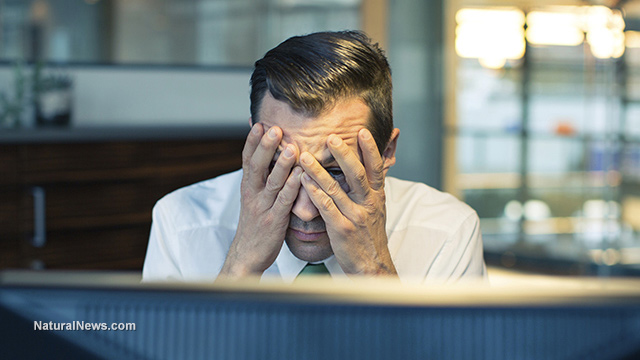5 ways to cope with anxiety without relying on drugs
11/28/2018 / By Zoey Sky

Anxiety is a universal emotion. Even if it’s linked to negative experiences, it can help you excel at work or school — it could even encourage you to become a better person. However, anxiety is a double-edged sword: it can make you overthink. If you develop an anxiety disorder because of constant anxiety, it can start to interfere with your daily life. But how can you deal with anxiety without using drugs that are often come with negative side effects?
Natural ways to cope with anxiety
You can start by trying some natural remedies for anxiety.
Biofeedback
Biofeedback, together with its brain-focused version called neurofeedback, is an effective and research-based treatment for anxiety. Biofeedback can teach you how to respond to your anxious thoughts and feelings healthily.
The treatment uses an electronic instrument that displays involuntary physiological processes. Biofeedback can teach you how to influence these processes by changing your thought processes voluntarily.
This visual and experimental process allows you to become an active participant in the treatment for your anxiety. With biofeedback, you can see your physiological responses to stress and learn how to manage and control them naturally. (Related: Take control of your anxiety with these proven natural remedies.)
Cognitive-Behavioral Therapy (CBT)
Trained psychologists and health professionals may use CBT to “identify, challenge, and alter thought processes to reduce anxiety symptoms and avoidant behavior.” CBT often involves a structured treatment plan that is implemented in a specified timeframe.
CBT is a goal-oriented treatment, and it requires the participant to accomplish certain activities outside of therapy. Since feeling anxious is tied to the interpretation of the biological and chemical changes (e.g., differentiating anxiety and excitement), CBT focuses on reframing negative beliefs and thinking patterns so individuals can minimize their subjective experience of anxiety.
Healthy lifestyle choices
This remedy involves taking better care of yourself to minimize anxiety and improve your emotional well-being. Here are some suggestions for healthy lifestyle choices:
- Eat healthily and exercise regularly. Proper nutrition can improve your mental health and exercise can release pent-up stress and energy in your body.
- Follow a sleep routine. Sleep deprivation may worsen anxiety, so go to bed and wake up at the same time daily. If you get enough sleep, you’ll be better equipped to deal with everyday stress
- Get enough rest. Try some relaxing hobbies, such as reading, listening to music, or walking. These activities can also help you relax.
- Limit your caffeine intake. Caffeinated drinks like coffee, energy drinks, and tea may aggravate anxiety. Caffeine, which is a stimulant drug, makes you feel on edge and it can cause heart palpitations, which are symptoms also linked to anxiety.
- Seek support. Talk to loved ones or a professional about your anxiety and addiction. Talking to someone you trust can help you make positive changes in your life.
Mindfulness and meditation
Mindfulness is a focusing technique that helps you become more aware of your body, emotions, and thoughts.
You can practice mindfulness by following these steps:
- Sit or stand in a relaxed posture, then breathe deeply.
- Inhale slowly and hold your breath for four seconds, then release it gradually over five seconds.
- Focus on your breathing. If your mind starts wandering, acknowledge the thought without judgment then release it.
- Try to refocus on your breath.
Mindfulness requires constant practice and patience, but don’t feel bad if your mind wanders. This method helps your body and mind relax, and it can help your mind focus on the present.
Anxiety makes you ruminate about the past or worry about the future, but mindfulness helps you stay in the present. Studies also show that mindfulness can help improve control in the brain, an excellent remedy for anxiety.
Yoga
Yoga, like mindfulness and meditation, is another practice that teaches you to become more introspective. Yoga focuses on breathing and the body.
When you practice yoga, you’ll learn how to breathe deeply while in uncomfortable positions. Yoga can also help you learn how to breathe through stress using just your body and mind.
Yoga is good for anxiety because it increases GABA levels that can help you relax. Data from studies show that yoga is more relaxing and it’s linked to higher GABA, compared to walking or other forms of exercise.
To manage your anxiety, you must commit to your recovery. These five natural remedies focus on relaxation, improved self-awareness, and understanding your anxiety so you can manage it successfully.
To learn more about anxiety and other natural ways to manage it, visit Mind.news.
Sources include:
Tagged Under: Anxiety, destressing tips, healthy lifestyle, Meditation, mind body science, mind-brain connection, mindfulness, natural healing, natural remedies, neurocognitive health, Psychology, Yoga
RECENT NEWS & ARTICLES
COPYRIGHT © 2017 BEATDEPRESSION.NEWS
All content posted on this site is protected under Free Speech. BeatDepression.news is not responsible for content written by contributing authors. The information on this site is provided for educational and entertainment purposes only. It is not intended as a substitute for professional advice of any kind. BeatDepression.news assumes no responsibility for the use or misuse of this material. All trademarks, registered trademarks and service marks mentioned on this site are the property of their respective owners.



















